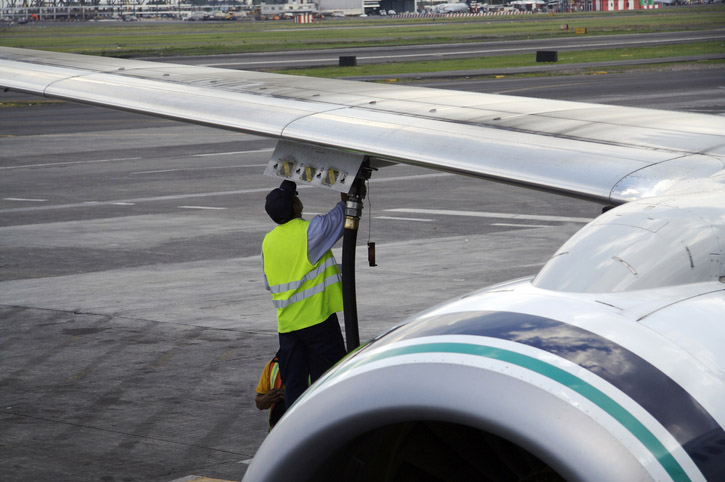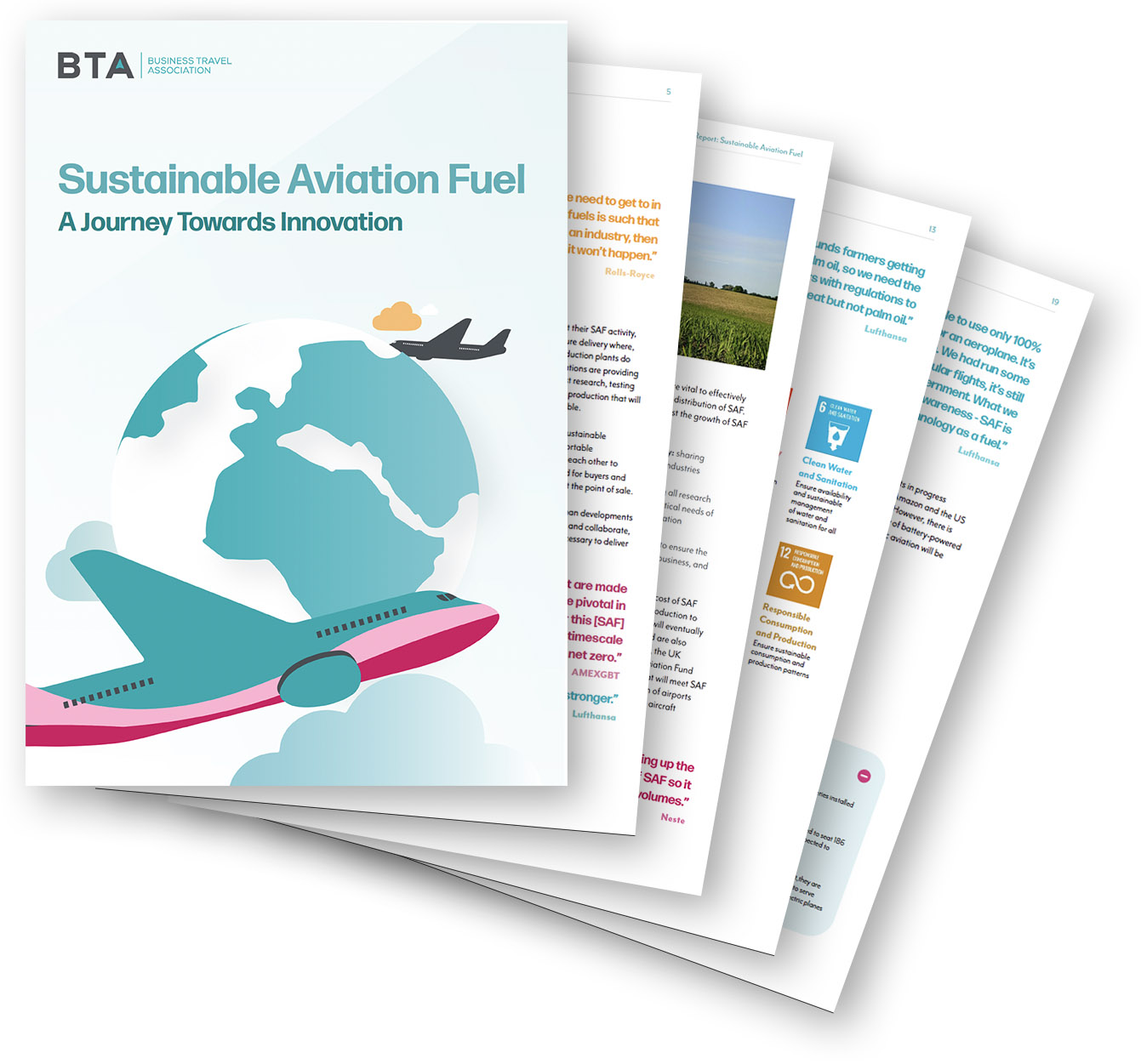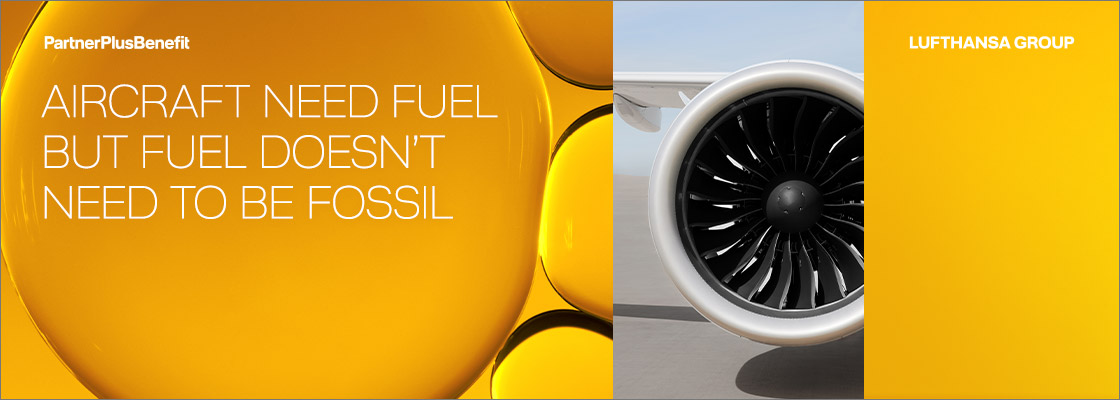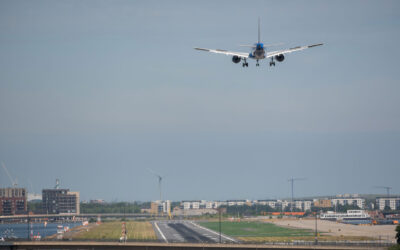Since the launch of the inaugural Environmental, Social and Governance (ESG) benchmarking report, the Business Travel Association (BTA) is building on its ESG research to tackle the industry’s environmental concerns around decarbonisation. Now, as the BTA publish their third report, this time a detailed investigation into sustainable aviation fuel (SAF), we consider the pros and cons of SAF and question whether it’s the magic bullet so many think it to be.
The BTA’s report examine’s how SAF is sourced, its production, distribution and use, and explores the environmental alternatives for the aviation industry. The report also unpicks its impact on the UN’s Sustainable Development Goals (SDGs).
Here we present a snapshot overview of the reports key finding along with an analytical assessment from Gray Dawes’ own Director of Account Management, Ian Currington.
Introduction
In the last 10 years, the environmental landscape has completely changed, with increased pressure on businesses to react. Today, the topic of global warming and investing in sustainable fuels, offsetting practices and renewable energy is discussed in boardrooms across the world.
Business travel is vital to economic growth through the transportation of experts and skilled workers. However, the aviation industry is a large contributor to global CO2 emissions. So how do we efficiently overcome the environmental ramifications of travel whilst ensuring that vital business travel continues?
Since the launch of our inaugural Environmental, Social and Governance (ESG) benchmarking report, the Business Travel Association (BTA) is building on its ESG research to tackle the industry’s environmental concerns around decarbonisation. Following our exploration into carbon offsetting, I am thrilled to introduce the third ESG report produced by the BTA – a detailed investigation into sustainable aviation fuel (SAF).
This report will assess the pros and cons of SAF, including its sourcing, production, distribution, and use, explore environmental alternatives for the aviation industry and unpick its impact on the UN’s Sustainable Development Goals (SDGs).
Vitally, our research finds that the successful delivery and integration of SAF worldwide is dependent on multi-industry communication and co-operation. Climate change is a worldwide issue, and we must treat it as such, ensuring that the solution is globally available.
More must be done by governments to guarantee sector and nationwide collaboration to make the production and distribution of SAF more efficient and reliable. We are asking to work together with you to make this happen.
This report tackles the key environmental concerns that the BTA and our partners aim to challenge that continue to impact the aviation industry and the business travel sector. Our research is drawn from interviews with SAF providers Travel Management Companies (TMCs), distributors and airlines. I sincerely thank all the individuals involved for contributing their knowledge, time and enthusiasm to this report, to ensure that we can secure a greener future for business travel and the planet.
Our previous report on carbon offsetting outlined that we must focus on reducing the industry’s carbon output, and the future of SAF is a hopeful alternative. This task is one built on sector-wide collaboration, and we hope this report will stimulate exactly that.
I am encouraged by the success of our carbon offsetting report, the BTA’s Planet Plan meetings and the enthusiasm of our friends and partners across the industry to tackle global warming. We have the power to make impactful and positive changes to our planet and we can make it a reality, together. I welcome all feedback and knowledge on the topics addressed in this report.

Clive Wratten
CEO of the Business Travel Association (BTA)
Executive Summary
One thing is clear: the future of green aviation depends on SAF. Our research finds that the travel industry sees SAF as a strong solution to stifle the aviation industry’s environmental issues. Many have noted that SAF will do the ‘heavy lifting’ and pave the way for future sustainable alternatives such as hydrogen and electric aviation. Yet it is understood that we must drastically act as climate change continues to threaten to overtake SAF’s development pathway.
Interviewees highlighted that the price of SAF holds the industry back from implementing it worldwide. Our research finds that more must be done by governments to ease the price burden of SAF and other sustainable alternatives to escalate its global distribution and operation.
The BTA calls on the UK government to draft a watertight SAF mandate, provide grants for developers to boost production and offer subsidies to those purchasing and using SAF in greater quantities. It is of paramount importance that the business travel industry and governments worldwide work together to ensure SAF becomes the first choice over fossil fuels. There is a risk that the price and use of SAF will increase ticket prices for travellers and we must work together to avoid this as much as possible while focusing on boosting SAF quantities.
Those we interviewed were candid about their SAF activity, disclosing their investment in SAF for future delivery where, in many cases, the SAF refining, and production plants do not yet exist. In doing this, these organisations are providing SAF vendors with up-front capital to boost research, testing and building of technology for future SAF production that will ensure this alternative fuel is readily available.
It is critical that we continue to champion sustainable alternatives, even if this may mean uncomfortable conversations with suppliers. We must hold each other to account and as a part of this, there is a need for buyers and travellers to understand their own outputs at the point of sale.
As the rate of flying increases more rapidly than developments in SAF, it is fundamental that we learn, share and collaborate, to drive the innovation and developments necessary to deliver the future of green aviation.

“We must start accepting that combating climate change comes at a cost. Yet the question should not be ‘what does SAF cost?’ but rather ‘what will the cost be if we don’t use SAF?”
Neste
“The scale of where we need to get to in terms of sustainable fuels is such that unless we collaborate as an industry, then it won’t happen.”
Rolls-Royce
“The investment decisions that are made in these next 2 to 3 years are pivotal in terms of determining whether this [SAF] market accelerates in the timescale needed to achieve net zero.”
AMEXGBT
“Collaboration needs to be stronger.”
Lufthansa
With PartnerPlusBenefit, the Lufthansa Group corporate rewards program, Benefit Points can now be converted into Sustainable Aviation Fuel (SAF).
SAF is the sustainable alternative to fossil fuel. Compared to conventional kerosene, SAF reduces carbon emissions by up to 80%.
Effective 1 January 2023, the regular PartnerPlusBenefit conditions on the expiry of Benefit Points will apply again. An overview of the points accrued, which are about to expire, are highlighted separately in your Benefit Points account. Points that will expire are marked in red.
In order to use the accrued points due to expire profitably before the end of this year, convert Benefit Points into Sustainable Aviation Fuel now and reduce your company’s carbon footprint.
In My Opinion…
Is Sustainable Aviation Fuel really the magic bullet that so many in the travel industry believe it to be?
We caught up with Gray Dawes Travel’s Director of Account Management, Ian Currington – a active sustainability champion – to find out what he thinks about SAF.

Ian Currington
Director of Account Management
I taken a keen interest in the topic of SAF and, having studied the BTA’s report, I feel we must question the viability and knock-on impact of Sustainable Aviation Fuel development to the wider society and environment. For me the following paragraphs featured in this important document are key:
The production of SAF uses a lot of land and resources, creating issues surrounding food security, deforestation (!), water, and land use. This may result in competition for land used for other needs like food and housing.
Furthermore, despite the positive impact SAF has on the environment, the production and harvest of these feedstocks threatens other industries. For example, cooking oils are often used for livestock feed, or the paper industry which relies heavily on forestry waste.
Competition for the latter threatens overexploitation, threatening the natural environment. Taking crop wastes off the land solely to produce SAF means lower organic matter being returned into the soil, therefore reducing the fertility and structure of the soil, which then limits the use of that land after its harvest.
The concept of SAF is good, however looking through all the noise and posturing (mostly by people invested into SAF themselves), I can only see a limit of what can be produced in the precious and agricultural land space available. The competition for land will drive up food prices and availability. Also, as the BTA’s report says, the SAF crops damage the soil structure which requires a very complex balancing act by farms.
The question is: what’s the alternative though, given new technology isn’t yet available?
Is SAF really the panacea for the travel industry and is anyone providing the alternative balance to the argument?
Related Articles
Inside the Business Travel Show Europe 2025
Held in the huge conference halls of ExCeL London, the Business Travel Show Europe 2025 was a sparkling celebration of the innovation within the industry, and we at Gray Dawes were proud to be at the beating heart of it all. In this article, we take you behind the scenes of the show, reflect on a few eye-opening days, and share how Gray Dawes continues to lead the way with our Always On approach to delivering High Touch, High Tech, and High Content service at every stage of a business trip.
Onwards and Upwards with ITA Airways
ITA Airways, Italy’s flagship carrier, has expanded significantly since we last spoke with them. They now operate as far east as Tokyo and as far west as San Francisco. In this article, we chat to ITA Airways about their integration with Lufthansa Group, their commitment to sustainable travel, their Volare points program, and much more.
7 Things We Learned From the BTA Rail Whitepaper
We highlight the key findings of the BTA’s recent report into the British rail infrastructure, and explore their recommendations for creating a more integrated, efficient, and business-friendly rail transport system that supports long-term economic and environmental goals.





